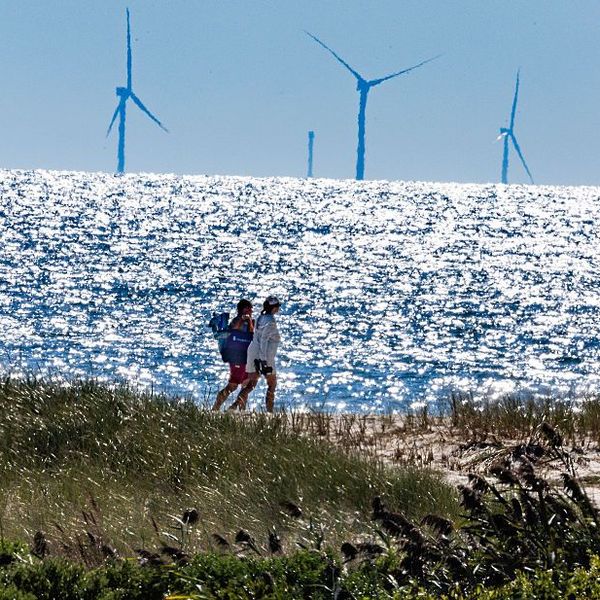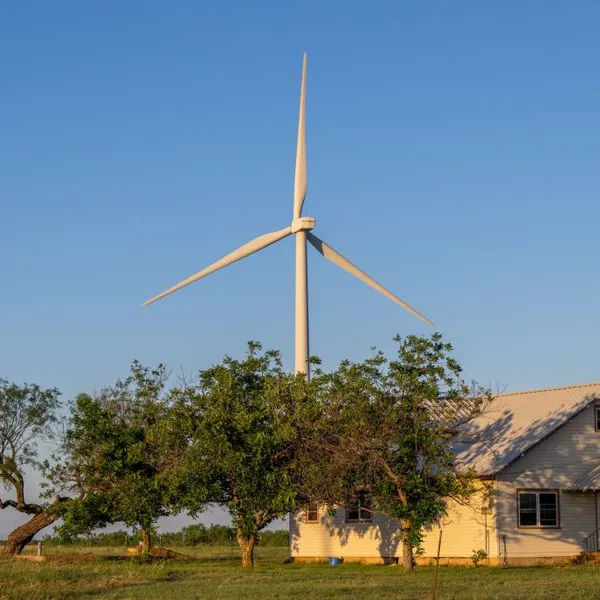
"Amid this climate and extinction emergency, the U.S. can't afford to stick with the same centralized, profit-driven electricity system that drove us here in the first place," said Jean Su, the director of the Center for Biological Diversity's new Energy Justice Program. (Photo: Becker1999/Flickr/cc)
New Program Set to Fight for 'Electricity Future That Works for People and the Planet'
The new effort will focus on utilities' monopolies and reliance on fossil fuels.
The Center for Biological Diversity on Monday rolled out a new program to push back against the nation's community- and wildlife-harming energy system that the climate advocacy group says is based on fossil fuels and a "centralized monopoly on power."
The goal of the new effort, the Energy Justice Program, is to help forge a path towards a just and renewables-based energy future.
"Our broken energy system threatens our climate and our future," said Jean Su, the Energy Justice Program's new director, in a statement. "Utilities were given monopolies to ensure public access to electricity, but these dinosaur corporations are now hurting the public interest by blocking the clean energy transition to profit off the fossil fuel era."
"In this era of climate catastrophe," she continued, "we have to stop these outdated monopolies and usher in a new electricity future that works for people and the planet."
To meet those goals, the new program will pursue a number of avenues, including using legal action to fight utilities' obstruction of clean energy efforts, helping communities advance local solar programs, and crafting energy policies on the state, federal, and international levels.
Some of that work is already underway. In June the Center filed a brief with a federal court in a bid to block Arizona power utility Salt River Project from slapping a 60-percent electricity rate hike on rooftop solar customers--a move the group described (pdf) as an obstacle to achieving "the energy transition demanded by climate science."
The Center is among the groups in Energy Justice NC. The diverse coalition that seeks to end the energy stranglehold in North Carolina held by Duke Energy, which continues to invest in fossil fuel projects
The time for a new energy system, says the Energy Justice Program, is now.
"Amid this climate and extinction emergency," said Su, "the U.S. can't afford to stick with the same centralized, profit-driven electricity system that drove us here in the first place. We have to seize this once-in-a-generation opportunity to design a new system of accountable, equitable, truly public power."
An Urgent Message From Our Co-Founder
Dear Common Dreams reader, The U.S. is on a fast track to authoritarianism like nothing I've ever seen. Meanwhile, corporate news outlets are utterly capitulating to Trump, twisting their coverage to avoid drawing his ire while lining up to stuff cash in his pockets. That's why I believe that Common Dreams is doing the best and most consequential reporting that we've ever done. Our small but mighty team is a progressive reporting powerhouse, covering the news every day that the corporate media never will. Our mission has always been simple: To inform. To inspire. And to ignite change for the common good. Now here's the key piece that I want all our readers to understand: None of this would be possible without your financial support. That's not just some fundraising cliche. It's the absolute and literal truth. We don't accept corporate advertising and never will. We don't have a paywall because we don't think people should be blocked from critical news based on their ability to pay. Everything we do is funded by the donations of readers like you. Will you donate now to help power the nonprofit, independent reporting of Common Dreams? Thank you for being a vital member of our community. Together, we can keep independent journalism alive when it’s needed most. - Craig Brown, Co-founder |
The Center for Biological Diversity on Monday rolled out a new program to push back against the nation's community- and wildlife-harming energy system that the climate advocacy group says is based on fossil fuels and a "centralized monopoly on power."
The goal of the new effort, the Energy Justice Program, is to help forge a path towards a just and renewables-based energy future.
"Our broken energy system threatens our climate and our future," said Jean Su, the Energy Justice Program's new director, in a statement. "Utilities were given monopolies to ensure public access to electricity, but these dinosaur corporations are now hurting the public interest by blocking the clean energy transition to profit off the fossil fuel era."
"In this era of climate catastrophe," she continued, "we have to stop these outdated monopolies and usher in a new electricity future that works for people and the planet."
To meet those goals, the new program will pursue a number of avenues, including using legal action to fight utilities' obstruction of clean energy efforts, helping communities advance local solar programs, and crafting energy policies on the state, federal, and international levels.
Some of that work is already underway. In June the Center filed a brief with a federal court in a bid to block Arizona power utility Salt River Project from slapping a 60-percent electricity rate hike on rooftop solar customers--a move the group described (pdf) as an obstacle to achieving "the energy transition demanded by climate science."
The Center is among the groups in Energy Justice NC. The diverse coalition that seeks to end the energy stranglehold in North Carolina held by Duke Energy, which continues to invest in fossil fuel projects
The time for a new energy system, says the Energy Justice Program, is now.
"Amid this climate and extinction emergency," said Su, "the U.S. can't afford to stick with the same centralized, profit-driven electricity system that drove us here in the first place. We have to seize this once-in-a-generation opportunity to design a new system of accountable, equitable, truly public power."
The Center for Biological Diversity on Monday rolled out a new program to push back against the nation's community- and wildlife-harming energy system that the climate advocacy group says is based on fossil fuels and a "centralized monopoly on power."
The goal of the new effort, the Energy Justice Program, is to help forge a path towards a just and renewables-based energy future.
"Our broken energy system threatens our climate and our future," said Jean Su, the Energy Justice Program's new director, in a statement. "Utilities were given monopolies to ensure public access to electricity, but these dinosaur corporations are now hurting the public interest by blocking the clean energy transition to profit off the fossil fuel era."
"In this era of climate catastrophe," she continued, "we have to stop these outdated monopolies and usher in a new electricity future that works for people and the planet."
To meet those goals, the new program will pursue a number of avenues, including using legal action to fight utilities' obstruction of clean energy efforts, helping communities advance local solar programs, and crafting energy policies on the state, federal, and international levels.
Some of that work is already underway. In June the Center filed a brief with a federal court in a bid to block Arizona power utility Salt River Project from slapping a 60-percent electricity rate hike on rooftop solar customers--a move the group described (pdf) as an obstacle to achieving "the energy transition demanded by climate science."
The Center is among the groups in Energy Justice NC. The diverse coalition that seeks to end the energy stranglehold in North Carolina held by Duke Energy, which continues to invest in fossil fuel projects
The time for a new energy system, says the Energy Justice Program, is now.
"Amid this climate and extinction emergency," said Su, "the U.S. can't afford to stick with the same centralized, profit-driven electricity system that drove us here in the first place. We have to seize this once-in-a-generation opportunity to design a new system of accountable, equitable, truly public power."

